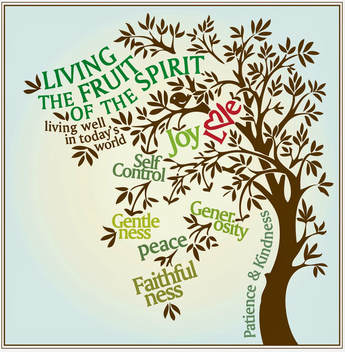
A few weeks ago I preached my annual Spiritual Gifts sermon at Church of Divine Guidance. The sermon this year was on the motivational gifts; prophecy, teaching, giving, exhortation/encouragement, administration/leadership, mercy and ministering/serving/helps.
I read something, a few days ago, written by Dr. Charles Stanley, which I’ll share later in this post, that reminded me of a Bible Study that I lead nearly five years ago on the “Fruit of the Spirit”. Today the Church is more knowledgeable than ever about the gifts of the Spirit but we don't have much knowledge or understanding of the Fruit of the Spirit. The two are connected and we need to understand that connection.
Every believer is indwelt by the Holy Spirit at conversion (salvation). The Holy Spirit gives each believer at least one spiritual gift at the moment they receive salvation.
Romans 12:3-8 (NKJV)3 For I say, through the grace given to me, to everyone who is among you, not to think of himself more highly than he ought to think, but to think soberly, as God has dealt to each one a measure of faith.4 For as we have many members in one body, but all the members do not have the same function,5 so we, being many, are one body in Christ, and individually members of one another.6 Having then gifts differing according to the grace that is given to us, let us use them: if prophecy, let us prophesy in proportion to our faith;7 or ministry, let us use it in our ministering; he who teaches, in teaching;8 he who exhorts, in exhortation; he who gives, with liberality; he who leads, with diligence; he who shows mercy, with cheerfulness.
1 Corinthians 12:4, 7-11 (NKJV)4 There are diversities of gifts, but the same Spirit. 7 But the manifestation of the Spirit is given to each one for the profit of all:8 for to one is given the word of wisdom through the Spirit, to another the word of knowledge through the same Spirit,9 to another faith by the same Spirit, to another gifts of healings by the same Spirit,10 to another the working of miracles, to another prophecy, to another discerning of spirits, to another different kinds of tongues, to another the interpretation of tongues.11 But one and the same Spirit works all these things, distributing to each one individually as He wills.
There is a command and mandate to be be filled with the Spirit. To be filled is to be completely controlled by the Holy Spirit. To be filled means that the Holy Spirit has the freedom to occupy every part of our lives, guiding and controlling us. The believer should be so completely yielded to the Holy Spirit that He can possess them fully and, in that sense, fill them. The fruit of the spirit is developed in each believer as they allow the Holy Spirit to fill and control their lives.
Ephesians 5:18-21 (NKJV)18 And do not be drunk with wine, in which is dissipation; but be filled with the Spirit,19 speaking to one another in psalms and hymns and spiritual songs, singing and making melody in your heart to the Lord,20 giving thanks always for all things to God the Father in the name of our Lord Jesus Christ,21 submitting to one another in the fear of God.
The fruit of the Holy Spirit is the result of the Holy Spirit’s presence in the life of a Christian.
Romans 8:9 (NKJV)9 But you are not in the flesh but in the Spirit, if indeed the Spirit of God dwells in you. Now if anyone does not have the Spirit of Christ, he is not His.
1 Corinthians 12:13 (NKJV)13 For by one Spirit we were all baptized into one body--whether Jews or Greeks, whether slaves or free--and have all been made to drink into one Spirit.
Ephesians 1:13-14 (NKJV)13 In Him you also trusted, after you heard the word of truth, the gospel of your salvation; in whom also, having believed, you were sealed with the Holy Spirit of promise,14 who is the guarantee of our inheritance until the redemption of the purchased possession, to the praise of His glory.
It is the Holy Spirit's job to conform us to the image of Christ, making us more like Him.
Romans 8:29 (NKJV) For whom He foreknew, He also predestined to be conformed to the image of His Son, that He might be the firstborn among many brethren.
2 Corinthians 5:17 (NKJV) Therefore, if anyone is in Christ, he is a new creation; old things have passed away; behold, all things have become new.
The “fruit” of the Spirit is the expression of our renewed nature as it is seen by others.
Matthew 7:15-23 (NKJV)15 "Beware of false prophets, who come to you in sheep's clothing, but inwardly they are ravenous wolves.16 You will know them by their fruits. Do men gather grapes from thornbushes or figs from thistles?17 Even so, every good tree bears good fruit, but a bad tree bears bad fruit.18 A good tree cannot bear bad fruit, nor can a bad tree bear good fruit.19 Every tree that does not bear good fruit is cut down and thrown into the fire.20 Therefore by their fruits you will know them.21 "Not everyone who says to Me, 'Lord, Lord,' shall enter the kingdom of heaven, but he who does the will of My Father in heaven.22 Many will say to Me in that day, 'Lord, Lord, have we not prophesied in Your name, cast out demons in Your name, and done many wonders in Your name?'23 And then I will declare to them, 'I never knew you; depart from Me, you who practice lawlessness!'
The fruit of the Holy Spirit is in direct contrast with the acts of the sinful nature.
Galatians 5:19-21 (NKJV)19 Now the works of the flesh are evident, which are: adultery, fornication, uncleanness, lewdness,20 idolatry, sorcery, hatred, contentions, jealousies, outbursts of wrath, selfish ambitions, dissensions, heresies,21 envy, murders, drunkenness, revelries, and the like; of which I tell you beforehand, just as I also told you in time past, that those who practice such things will not inherit the kingdom of God.
This passage describes all people, to varying degrees, when they do not know Christ and therefore are not under the influence of the Holy Spirit. Our sinful flesh produces certain types of fruit that reflect our nature, and the Holy Spirit produces types of fruit that reflect His nature.
An important point is that the word fruit is singular, and emphasizes the unity of the life in the Spirit as opposed to the instability of life in the flesh. The singular Fruit of the Spirit flows from love of God which produces the character of Christ in the believer..
Love
1 John 4:8 (NKJV) He who does not love does not know God, for God is love.
1 Corinthians 13:13 (NKJV) And now abide faith, hope, love, these three; but the greatest of these is love.
Galatians 5:6 (NKJV) For in Christ Jesus neither circumcision nor uncircumcision avails anything, but faith working through love.
Joy
John 15:11 (NKJV)1 These things I have spoken to you, that My joy may remain in you, and that your joy may be full.
1 Thessalonians 1:6 (NKJV) And you became followers of us and of the Lord, having received the word in much affliction, with joy of the Holy Spirit,
Romans 14:17 (NKJV) for the kingdom of God is not eating and drinking, but righteousness and peace and joy in the Holy Spirit.
Peace
John 14:27 (NKJV) Peace I leave with you, My peace I give to you; not as the world gives do I give to you. Let not your heart be troubled, neither let it be afraid.
Philippians 4:6-7 (NKJV)6 Be anxious for nothing, but in everything by prayer and supplication, with thanksgiving, let your requests be made known to God;7 and the peace of God, which surpasses all understanding, will guard your hearts and minds through Christ Jesus.
Ephesians 4:1-3 (NKJV)1 I, therefore, the prisoner of the Lord, beseech you to walk worthy of the calling with which you were called,2 with all lowliness and gentleness, with longsuffering, bearing with one another in love,3 endeavoring to keep the unity of the Spirit in the bond of peace.
.
Kindness
Ephesians 4:32 (NKJV)32 And be kind to one another, tenderhearted, forgiving one another, just as God in Christ forgave you.
Colossians 3:12-13 (NKJV)12 Therefore, as the elect of God, holy and beloved, put on tender mercies, kindness, humility, meekness, longsuffering;13 bearing with one another, and forgiving one another, if anyone has a complaint against another; even as Christ forgave you, so you also must do.
Goodness
Matthew 12:35 (NKJV)35 A good man out of the good treasure of his heart brings forth good things, and an evil man out of the evil treasure brings forth evil things.
Galatians 6:10 (NKJV) Therefore, as we have opportunity, let us do good to all, especially to those who are of the household of faith.
Faithfulness
Luke 12:42-44 (NKJV)42 And the Lord said, "Who then is that faithful and wise steward, whom his master will make ruler over his household, to give them their portion of food in due season?43 Blessed is that servant whom his master will find so doing when he comes.44 Truly, I say to you that he will make him ruler over all that he has.
Titus 2:9-10 (NKJV)9 Exhort bondservants to be obedient to their own masters, to be well pleasing in all things, not answering back,10 not pilfering, but showing all good fidelity, that they may adorn the doctrine of God our Savior in all things.
1 Corinthians 4:2 (NKJV) Moreover it is required in stewards that one be found faithful.
Matthew 5:5 (NKJV) Blessed are the meek, For they shall inherit the earth.
Gentleness
Titus 3:1-2 (NKJV)1 Remind them to be subject to rulers and authorities, to obey, to be ready for every good work,2 to speak evil of no one, to be peaceable, gentle, showing all humility to all men.
Galatians 6:1 (NKJV) Brethren, if a man is overtaken in any trespass, you who are spiritual restore such a one in a spirit of gentleness, considering yourself lest you also be tempted.
Self-Control
2 Timothy 1:7 (NKJV) For God has not given us a spirit of fear, but of power and of love and of a sound mind.
1 Thessalonians 5:6 (NKJV)6 Therefore let us not sleep, as others do, but let us watch and be sober.

Brokenness: Prepare to Bear Much Fruit
by Charles Stanley, from Finding God's Blessings In Brokenness
God Is Our All in All
Brokenness brings us to the place where we say, “All that matters is God and His presence in my life,” the place where we awaken with God’s purposes in mind, praying, “What do you want me to do, say, and be today in order to bring You glory?” At that point we are in submission: we desire God to produce in us the inner fruit of Christlike character.
The Character of Christ
The fruits of the Spirit described by the apostle Paul in Galatians 5:22-23 ESV and listed here reflect the character of Jesus Christ. His character is marked by these:
Love: Christlike sacrificial love gives, and then gives more, and then gives still more. When we are following Christ and His example, we can pour out this kind of love on others.
Joy: Every time we are broken by God and sin is defeated in our lives, joy is the outcome. And when we are full of joy, people notice and are drawn to the Lord, the source of our joy.
Peace: When we submit our lives completely to Christ, we choose to trust that He is in control, and we are able to rest in His arms. Being at peace in one’s spirit is a countercultural and appealing trait in this pressure-filled world.
Patience: When we know that we are God’s for all eternity, we are much more inclined to wait on Him for what He has for us in this life, and we can be patient with others who we think are interfering with our plans.
Kindness: Brokenness brings us to the place where we realize we have no rights; we have turned them over to God. We no longer insist on having our own way or getting what we want when we want it. As a result, we are kinder to others.
Goodness: When God breaks us, we realize that God alone is good and that the only goodness we have in us is because the Holy Spirit lives in us. The Spirit’s presence in us gives us the desire to do good works, make good decisions, and come up with good solutions. The goodness of God also compels us to look for the good in others and to encourage them, to help those in need, to pray for those who don’t know the Lord, and to seek justice on behalf of those who are oppressed.
Faithfulness: A broken spirit enables us to say, “I am truly Yours, Lord. You alone are God, and I never want to stray.” The Holy Spirit produces in us a desire to be in close relationship with the Father and to never leave Him, not for a moment. In human relationships, our faithfulness may be evident in our integrity and being true to our word.
Gentleness: We are able to be gracious and gentle with others when we have experienced brokenness because we recognize that God has been gracious and gentle with us.
Self-control: When we turn total control of our lives over to God, He gives us self-control, the ability to say no to Satan’s temptations, and the capacity to resist evil. This self-control makes it easier for us to live in a way that honors God and respects others.
In addition to producing this fruit in us, God breaks our voracious hunger to satisfy our own longings and desires. He breaks us so we will want what He wants, and we discover that God wants us to have what we need and what will bring us joy.
"Brokenness changes our desires."
The Outer Fruit of God’s Inner Presence
Brokenness causes us to consider the fruitfulness of our witness. The outer fruit that God calls us to produce is to declare His truth and to meet the needs of those we encounter who are in need. We are to be ready witnesses to God’s love and power. We are to reflect God’s compassion with our actions when someone needs help, with our lifestyles as unbelievers watch us, with service that builds up the body of Christ, and with our words when someone asks us about our hope, joy, or love.
Again, the reason for brokenness is so that we might realize that the life we live is not our life: it is Jesus’ life. And we must surrender on a daily basis to the life that He desires to live through us.
Then, what we discover through brokenness is that when we truly submit our will to Jesus’ will and allow Him to work through us, our service to others has much greater power and effectiveness.
The way to the blessing of a new character — the character of the Lord Jesus Christ himself — and of a new power in your personal ministry and service to others is going to be a path that involves brokenness. God has no other plan for us.
"Brokenness is His way to blessing."
Excerpted with permission from Finding God’s Blessings in Brokenness by Dr. Charles Stanley, copyright Charles F. Stanley.


 RSS Feed
RSS Feed